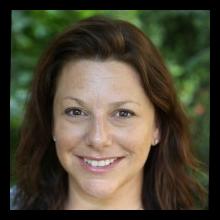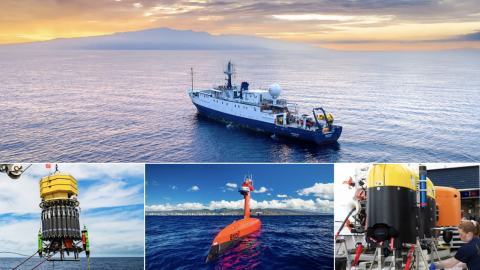
Aurora Elmore
Tell us about your work/research. What kinds of things do you do?
My research background was initially focused on analyzing tiny seashells who make their shells out of the sea water where they live. Once they become fossilized, the shell's chemical composition can be used to reconstruct ocean conditions of the past and to determine how the ocean reacts to changes in climate. Following my studies, I worked at several American and British universities examining the interactions between the Antarctic climate and circulation in the southern ocean. I then worked at National Geographic, and was in charge of the most complete scientific expedition to Mount Everest, which sent a team of 34 scientists to the highest mountain in the world. I also supervised research and conservation projects in the Galapagos and Antarctica. Since 2021, I have worked at NOAA where she oversees the Ocean Exploration Cooperative Institute and manage a wide portfolio of expeditions, technological developments, and outreach activities.
What sparked your initial interest in your career?
I have always loved the ocean and been fascinated by the natural world. I grew up being interested in science and asking lots of questions about how things work.
Who influenced you or encouraged you the most?
My parents always encouraged me to spend time in nature and to always ask questions.
What element of your work/study do you think is the most fascinating?
Last year, I had an amazing opportunity to go down in the Alvin science submarine, and it was so amazing to see the deep sea directly with my own eyes for the very first time after so many years of studying it by samples and viewing videos.
How did you get involved with the Ocean Exploration Trust?
I work for the US government's National Oceanographic and Atmospheric Administration (NOAA) and work closely with Ocean Exploration Trust through the Ocean Exploration Cooperative Institute (OECI).
What other jobs led you to your current career?
My first part-time job was scooping ice cream, but all of my jobs after that were related to water and the ocean- from lifeguard to scientist to program manager. When you're training to be a scientist, a lot of the focus is on working independently and becoming an expert in one narrow thing, but I always enjoyed learning new things and bringing groups of scientists together to answer even larger questions. As a program manager, I need to know and understand the science, but I primarily work to build research coalitions so that we can all benefit from the best possible research.
What are your degrees and certifications?
Bachelor of Science in Geology from Boston University
Masters of Science in Earth Science from the University of South Carolina
Ph.D. in Earth Science from Rutgers University
What are your hobbies?
I like gardening and recently began keeping bees
What advice would you give to someone who wants to have a career like yours?
It's really important to work hard and find things you enjoy, but it's critical to not be afraid of trying new things! You never know how the next step of your career will look until you try something that can start you down a whole new path.
Expeditions
Aurora participated in the following Ocean Exploration Trust expeditions:

